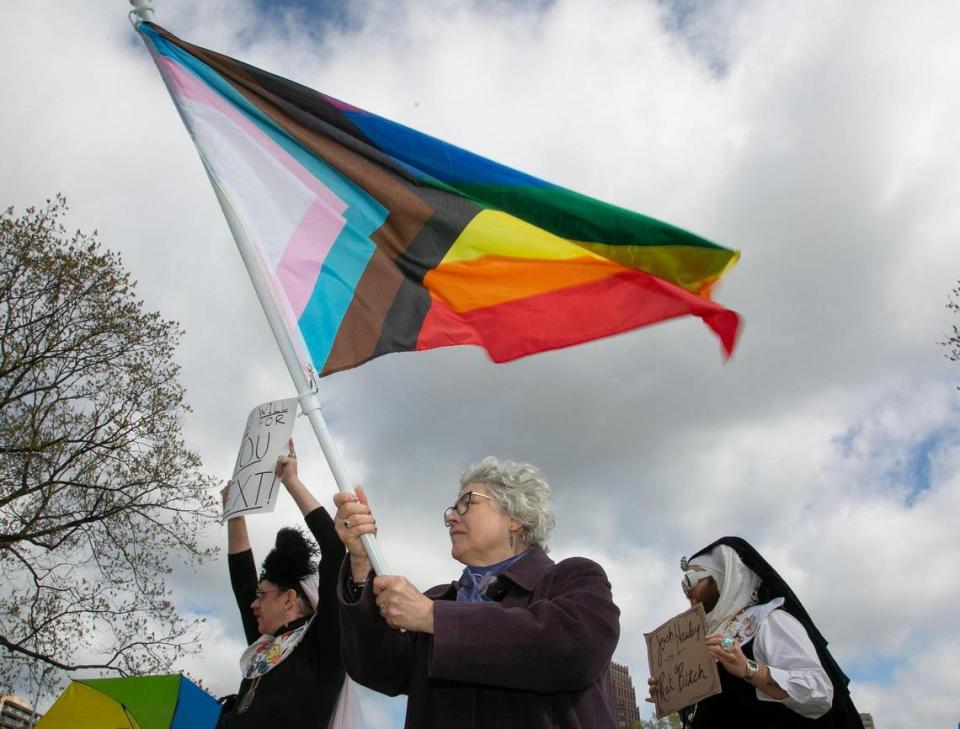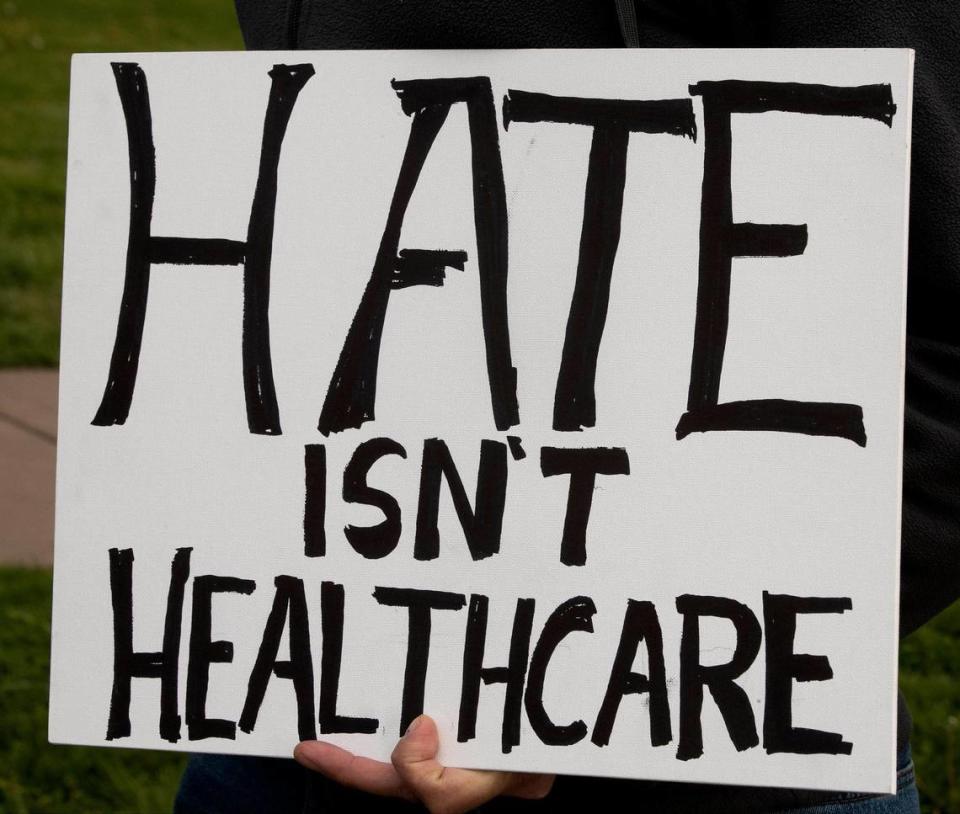Missouri’s gender-affirming care rules start Thursday. What that means for KC patients
Missouri’s new restrictions on gender-affirming health care — which critics say could effectively ban this care throughout the state — are set to go into effect on Thursday.
The “emergency rule” issued by state Attorney General Andrew Bailey’s office is thought to be the most restrictive order on gender-affirming health care in the country. Bailey confirmed that the ban will apply to adults as well as minors, setting it apart from restrictions in many other states.
Bailey’s ruling, unlike a law passed by legislators, is temporary and expires on Feb. 6, 2024.
The ACLU of Missouri and Lambda Legal have pledged to try to block enforcement of the restrictions through the courts.
“We will defend the rights of transgender people through any necessary legal action, just as we have done in other states engaging in this anti-science and discriminatory fearmongering,” the organizations wrote in a joint statement.
Kansas City’s LGBTQ+ Commission issued letters asking local prosecutors not to enforce the rule when it goes into effect, and called on the Kansas City Council to pass legislation designating the city a “safe haven” for gender-affirming health care.
Some providers, like Planned Parenthood Great Plains, have assured patients that they will continue providing services despite Missouri’s new rule, and are adding appointments in the days before the ruling goes into effect to address mounting anxieties.
“We’ve been a proud provider of gender-affirming care in Missouri for many years and on April 28, we’ll continue to offer that life-saving care at our health centers,” said Anamarie Rebori Simmons, a spokesperson for Planned Parenthood Great Plains.
“We will work within the confines of the egregious new laws the attorney general has put in place, but regardless, we will work with our patients to get them care in Missouri or get to care out of state.”
Details about how the rule will actually be enforced and exactly how it will affect ongoing care for transgender and nonbinary patients is still unclear.
Here’s what we know so far, and what some area providers are recommending patients do to prepare.
What does the attorney general’s rule on gender-affirming health care mean?
Gender-affirming health care is a combination of services including mental and physical health care that helps people better align with their gender identity, such as talk therapy, puberty-blocking medication, hormone replacement therapy and surgeries.
Under the new restrictions, Missouri providers will need to ensure and document that patients meet a set of strict qualifications in order to receive gender-affirming health care services, including completing 15 therapy sessions, being tested for autism and resolving all other mental health conditions. Critics have called these qualifications “cruel” and burdensome.
Because of how strict the qualifications are and the documentation required to meet them, some Missouri health care providers are concerned that they may need to stop providing certain services.
In preparation for the regulation to take effect, transgender and nonbinary Kansas Citians are taking a variety of measures to retain access to their health care — including stockpiling medication, seeking out-of-state providers or leaving Missouri entirely.
“I know one family that is selling their home and moving to California before their kid starts middle school in the fall,” said Emily High, the executive director of the Kansas City Center for Inclusion, a local LGBTQ+ community center.
“Not everyone has these options, but many will travel or utilize networks across state lines. Some will turn to black market (medication), which scares me.”
How will the new regulation affect ongoing gender-affirming health care?
It’s still unclear whether the regulation could halt treatment for those already receiving gender-affirming care in Missouri, according to several area health care providers.
They emergency rule requires that providers ensure and document that a patient has:
Experienced gender dysphoria for three consecutive years
Been screened for autism
Had at least 15 therapy sessions over 18 months
Been screened annually for “social contagion,” the widely debunked theory that gender dysphoria can spread among young people in a manner similar to social trends
Been screened annually for “social media addiction” if they are a minor
Resolved all other mental health conditions
However, the rule includes an exception for “continuing prescription or provision of a specific intervention that has already begun,” as long as the patient or provider “promptly seeks to initiate the treatments and assessments called for” in the rule.
Some understand this exception to mean that the rule doesn’t apply in the same way to patients already receiving gender-affirming health care as it does new patients, but local providers say it’s not so straightforward.
“They’re creating a mess,” said Marissa Taylor, a pharmacist from Kansas City, Kansas, who identifies as nonbinary. “They’re creating a situation where things are subjective and unclear.”
Taylor and other providers said it isn’t obvious whether ongoing care will need to pause until providers and patients can satisfy all of these requirements, or whether they will only need to begin the ongoing practices like annual screenings moving forward.
“We don’t actually know what is going to happen or how it’s going to be enforced,” said Kipp Ellis, a Kansas City nurse who identifies as transgender. “The ruling doesn’t even say how they’re actually going to go about enforcing this.”
What does this confusion mean for patients in the short term?
Regardless of the intention behind the exception for ongoing care, some in Kansas City worry that Missouri-based doctors and pharmacists will halt all of their gender-affirming services on April 27 to avoid legal consequences.
“What the AG wrote is that it will be illegal to provide care. So legality will be fought in the courts, but until it’s decidedly legal again, most (Missouri) providers will stop,” Taylor said.
“Our entire livelihood depends on us being able to keep our jobs and our licenses. So it’s going to be individual pharmacists saying, ‘I’m not willing to risk breaking the law by accident,’ and doctors saying, ‘I’m not willing to do this.’”
Some Missouri health care providers are working with transgender and nonbinary patients leading up to the ruling to answer questions and provide resources.
In the days before the rule goes into effect, Planned Parenthood Great Plains is hosting pop-up clinics for new gender-affirming health care patients, is increasing appointment availability and has launched a dedicated hotline and email for trans and nonbinary patients.
You can reach these services by calling 573-303-3479 or emailing GenderCare@ppgreatplains.org.
Plume, a telehealth clinic serving trans patients across the country with virtual appointments and mail-order prescriptions, announced Friday that it will offer “rapid response” appointments for Missouri patients ahead of the ban’s implementation.
“Up until the new rule is set to take effect on April 27, we are pulling together all available resources to help as many people as possible access a licensed clinician who can provide gender affirming hormone therapy,” the clinic wrote on Instagram.
What options do gender-affirming health care patients have?
Taylor, who works at the LGBTQ-affirming pharmacy Orchards Drug in Lawrence, posted guidance on social media for patients who may be affected by the Missouri ruling.
Their post recommends transferring current prescriptions to Kansas pharmacies with as many refills as possible before the ruling goes into effect.
“Before their doctor’s office closes, they can ask their doctor to send as many refills as they feel comfortable with to a pharmacy on the Kansas side. Because then that pharmacy will be able to keep dispensing even after the (rule takes effect),” Taylor told The Star.
“If the provider’s office shuts down services, the refills on that prescription in Kansas would still remain active.”
Gender-affirming health care has faced its own challenges in Kansas, where Democratic Gov. Laura Kelly vetoed four bills Thursday that target the transgender community. One bill sought to ban hormone therapy and gender transition surgery for minors, despite the fact that the latter is extremely rare.
Kansas’ House and Senate both fell far short of the two-thirds majority needed to override a veto when they first approved the bill earlier this month, meaning an override is not likely.
Taylor also recommended a handful of LGBTQ-friendly pharmacies in Kansas where patients may be able to transfer their hormone replacement therapy (HRT) prescriptions:
Hen House pharmacy locations in Kansas
O’Brien Pharmacy in Mission
Orchards Drug in Lawrence
Price Chopper at 75th and Metcalf in Overland Park
Sigler Pharmacy in Lenexa
They said that since testosterone is a controlled substance, doctors can only send a prescription of up to six months supply to a pharmacy in Kansas. Estrogen is not a controlled substance, meaning they can send in a prescription for up to a full year’s supply.
Can Missouri residents get their gender-affirming care from Kansas providers?
Yes, but only in person. Taylor said that Missouri residents are free to establish care with Kansas doctors, and only have to abide by Kansas’ laws if they visit their provider at a Kansas clinic.
“Missouri has no jurisdiction over a doctor in Kansas,” they said. “You can drive over to Kansas, see your doctor, go to a pharmacy (and) drive home as many times as you want.”
A few LGBTQ-friendly Kansas clinics Taylor recommended are the University of Kansas Health System, Planned Parenthood’s Wyandotte Health Center and Evolve MD in Lawrence.
However, accessing telehealth care from Missouri could pose a problem once the ruling goes into effect.
Taylor said that in virtual appointments, doctors have to follow the laws of both the state they are based in and the state where their patient is located. That means a Kansas doctor would have to follow Missouri’s restrictions if their patient is physically located in Missouri.
Transgender and nonbinary Kansas Citians can find more resources ahead of the rule taking effect through the Kansas City Center for Inclusion, Nafasi TransCare Collective, Transformations, PROMO Missouri and the Instagram account Trans Aid for MO.
The Star’s Katie Bernard and Kacen Bayless contributed reporting.
Do you have more questions about issues affected LGBTQ Kansas Citians? Ask the Service Journalism team at kcq@kcstar.com.



